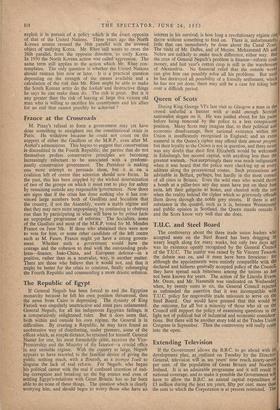France at the Crossroads
M. Pinay's refusal to form a government may yet have done something to straighten out the constitutional crisis in Paris. He withdrew because he could not count on the support of either the Gaullists or the M.R.P., even after M. Auriol's admonitions. This begins to suggest that conservatism is-discredited in the Fourth Republic; the parties that do not themselves profess conservative principles are becoming increasingly reluctant to be associated with a predomi- nantly conservative government. The President is making one more attempt to persuade them, but it is on a coalition left of centre that attention should now focus. In the past, this has been crippled by the wicked determination of two of the groups on which it must rest to play for safety by remaining outside any responsible government. Now there are signs that if the crisis has done nothing else it has con- vinced large numbers both of Gaullists and Socialists that the country, if not the Assembly, wants a stable regime and that they may earn more unpopularity by continuing to obstruct One than by participating in what will have to be prima facie an unpopular programme of reforms. The Socialists, some of the Gaullists and most of the M.R.P. voted for M. Mendes France on June 5th. If those who abstained then were now to vote for him, or some other candidate of the left centre such as M. Faure, France might yet have a strong govern- ment. Whether such a government would have the courage and the cohesion to deal with the outstanding prob- lems—finance, Indo-China, and European defence—in a positive, rather than in a neutralist, way, is another matter. There are those who believe that it would not, and that it might be better for the crisis to continue, finally submerging the Fourth. Republic and commanding a more drastic solution.


































 Previous page
Previous page